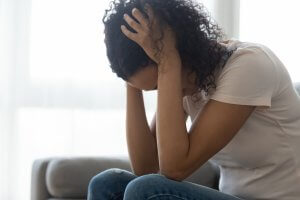Sober Black Girls on Sobriety
Empowerment. Support. Sobriety. These three words describe the Sober Black Girls Club, a safe online community where Black women, girls, and nonbinary people can share their struggles with substance use and also find resources, inspiration, and motivation to help them—wherever they may be in their recovery journey.
According to the 2021 National Survey on Drug Use and Health, 43,000 Black (non-Hispanic) women reported past-month heavy alcohol use; 193,000 reported past-month binge drinking. For women, the Centers for Disease Control and Prevention (CDC) defines heavy drinking as consuming 8 or more drinks per week; binge drinking means having 4 or more drinks on a single occasion.
In general, women in need of substance use treatment face several barriers to treatment, including shame, stigma, and fear of legal repercussions (e.g. involvement from child protection services). Additionally, Black women—more so than white women—cite limited financial resources to pay for treatment, a lack of transportation to get to treatment facilities, and living in communities not conducive to recovery, such as those riddled with drug activity or violence.
That’s why bringing awareness to the issue and shining light on solutions that can help Black women, girls, and nonbinary individuals is so important. And it’s the foundation of the Sober Black Girls Club.
Sobriety and Support
 Sober Black Girls Club’s founder Khadi A. Oluwatoyin and member J. Nicole were recently guests on American Addiction Centers’ talk show Addiction Talk. Joy Sutton, host of the award-winning show, interviewed the duo in the middle of Black History Month, highlighting all the good the organization does in helping women of color through sobriety.
Sober Black Girls Club’s founder Khadi A. Oluwatoyin and member J. Nicole were recently guests on American Addiction Centers’ talk show Addiction Talk. Joy Sutton, host of the award-winning show, interviewed the duo in the middle of Black History Month, highlighting all the good the organization does in helping women of color through sobriety.
Both Khadi and J. Nicole speak candidly about sobriety, alcohol use disorder, and empowering other Black women through their recovery and beyond.
Founded in 2018, the Sober Black Girls Club formed in response to the absence of socially and culturally adequate support for Black women in recovery or those considering sobriety. Five years later, the nonprofit runs a mentorship program, which connects Black women, girls, and nonbinary individuals with mentors who are farther along in their recovery journey. Additionally, the organization publishes a blog, features a podcast, hosts support meetings virtually, and even helps members with rehab expenses.
Watch the episode entitled “Creating a Safe Space: Two Black Women and Their Mission to Diversify Sobriety.”
Substance Misuse Followed by Long-Term Recovery
Khadi recalls battling depression but not recognizing it as depression at the time. “I just thought I had the blues. I was still going to work. [I was] just upset, miserable, and I was drinking. A year after my drinking turned from a drinking problem to a straight-up addiction, I couldn’t believe my therapist when she told me that’s what I was experiencing.”
to work. [I was] just upset, miserable, and I was drinking. A year after my drinking turned from a drinking problem to a straight-up addiction, I couldn’t believe my therapist when she told me that’s what I was experiencing.”
Even when Khadi thinks about addiction now, she admits, “The images, people, and concepts that come to mind when I think about addiction are not Black women. They’re usually white men. And then the second image that used to come up was white women. So, I had to learn what addiction looks like for Black people. What did it look like for me? What were the signs? How did I miss them?”
Khadi cites a recent study she found stating that Black women experience depression differently than other demographics. This resonates with her because she feels as though Black women in the United States specifically, have a lot of responsibilities to themselves and to their households. And with this responsibility comes a lot of stress. So, ultimately, it makes sense, from her perspective, that Black women experience depression in a unique way compared to others.
Though she was struggling with substance misuse, Khadi didn’t believe it was addiction. “I thought, ‘I am an attorney. I’m still going to work. I have my apartment. I have a car. I’m not houseless. What I’m experiencing cannot be addiction. And then I realized that I was addicted. My body was physically addicted.’”
She’s not the only one.
“I was a freshmen in high school [when I first started drinking],” J. Nicole, a proud member of Sober Black Girls Club and eponymous podcast contributor, shares. “Me and my group of friends, who were also Black and brown, started [drinking]. The reason behind the drinking is what made me feel like it wasn’t a problem. I played sports, we were drinking. If we won, we were drinking. If we lost, we were drinking. Just trying to be cool.”
She and her friends weren’t drinking every day, so J. Nicole didn’t think she had a problem. And that’s true for so many. Thanks to the media, movies, stories, and society, we paint this picture in our heads of what problematic alcohol use looks like and how it behaves. If individuals don’t see themselves in that picture, they may not think that their alcohol use has become a problem.
How do we alter that mindset so that those experiencing addiction may recognize it within themselves sooner? Addiction is a disease that crosses all demographic lines—men, women, Black, white, wealthy, poor, young, or old—it doesn’t matter.
If you find yourself battling a substance use disorder, please reach out for the help that you need today. To learn more about Khadi and J. Nicole’s journeys to sobriety and the Sober Black Girls Club, watch this episode of Addiction Talk.
*Some of the wording from the interview was edited for clarity.
